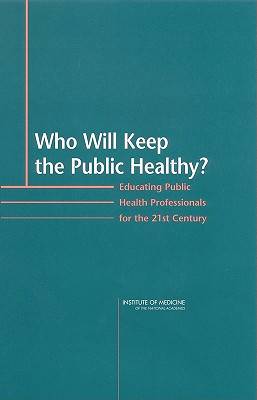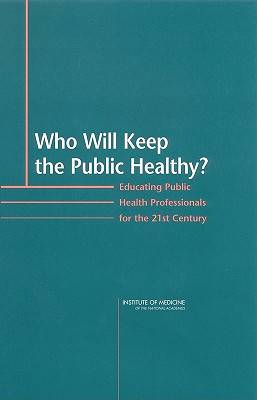
- Afhalen na 1 uur in een winkel met voorraad
- Gratis thuislevering in België vanaf € 30
- Ruim aanbod met 7 miljoen producten
- Afhalen na 1 uur in een winkel met voorraad
- Gratis thuislevering in België vanaf € 30
- Ruim aanbod met 7 miljoen producten
Zoeken
Who Will Keep the Public Healthy?
Educating Public Health Professionals for the 21st Century
Institute of Medicine, Board on Health Promotion and Disease Prevention, Committee on Educating Public Health Professionals for the 21st
Hardcover | Engels
€ 62,95
+ 125 punten
Uitvoering
Omschrijving
Bioterrorism, drug--resistant disease, transmission of disease by global travel . . . there's no shortage of challenges facing America's public health officials. Men and women preparing to enter the field require state-of-the-art training to meet these increasing threats to the public health. But are the programs they rely on provide the high caliber professional training they require?
Who Will Keep the Public Healthy? provides an overview of the past, present, and future of public health education, assessing its readiness to provide the training and education needed to prepare men and women to face 21st century challenges. Advocating an ecological approach to public health, the Institute of Medicine examines the role of public health schools and degree--granting programs, medical schools, nursing schools, and government agencies, as well as other institutions that foster public health education and leadership. Specific recommendations address the content of public health education, qualifications for faculty, availability of supervised practice, opportunities for cross--disciplinary research and education, cooperation with government agencies, and government funding for education.
Eight areas of critical importance to public health education in the 21st century are examined in depth: informatics, genomics, communication, cultural competence, community-based participatory research, global health, policy and law, and public health ethics. The book also includes a discussion of the policy implications of its ecological framework.
Who Will Keep the Public Healthy? provides an overview of the past, present, and future of public health education, assessing its readiness to provide the training and education needed to prepare men and women to face 21st century challenges. Advocating an ecological approach to public health, the Institute of Medicine examines the role of public health schools and degree--granting programs, medical schools, nursing schools, and government agencies, as well as other institutions that foster public health education and leadership. Specific recommendations address the content of public health education, qualifications for faculty, availability of supervised practice, opportunities for cross--disciplinary research and education, cooperation with government agencies, and government funding for education.
Eight areas of critical importance to public health education in the 21st century are examined in depth: informatics, genomics, communication, cultural competence, community-based participatory research, global health, policy and law, and public health ethics. The book also includes a discussion of the policy implications of its ecological framework.
Specificaties
Betrokkenen
- Auteur(s):
- Uitgeverij:
Inhoud
- Aantal bladzijden:
- 320
- Taal:
- Engels
Eigenschappen
- Productcode (EAN):
- 9780309085427
- Verschijningsdatum:
- 29/05/2003
- Uitvoering:
- Hardcover
- Formaat:
- Genaaid
- Afmetingen:
- 165 mm x 237 mm
- Gewicht:
- 680 g

Alleen bij Standaard Boekhandel
+ 125 punten op je klantenkaart van Standaard Boekhandel
Beoordelingen
We publiceren alleen reviews die voldoen aan de voorwaarden voor reviews. Bekijk onze voorwaarden voor reviews.











